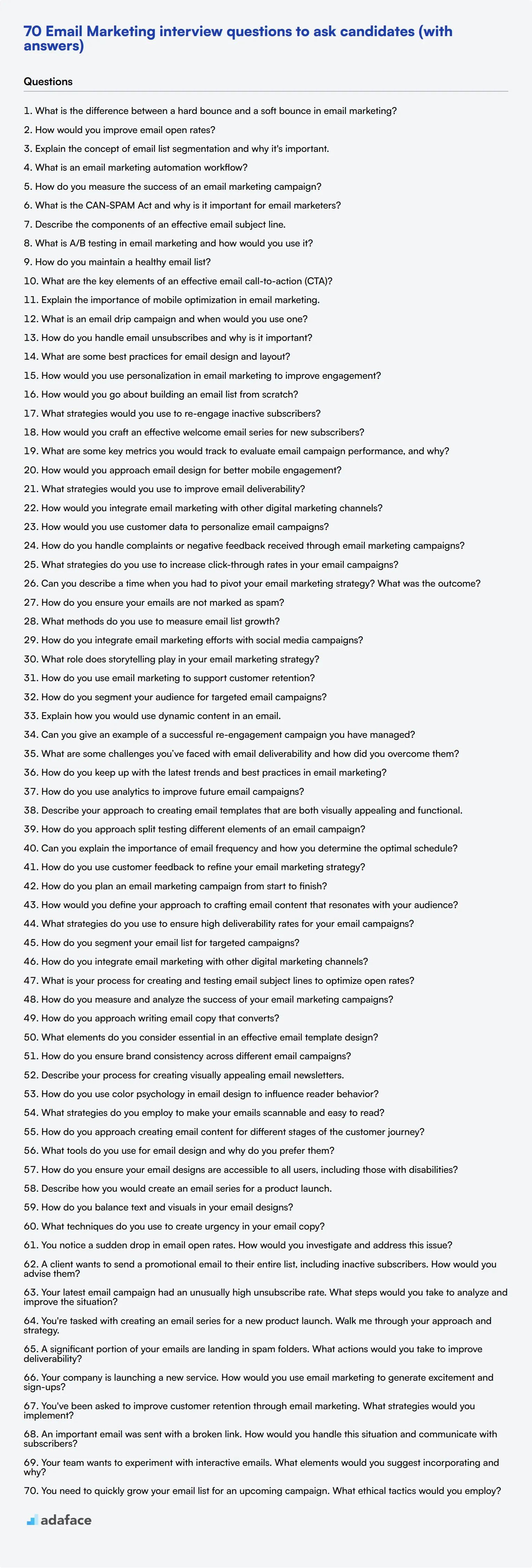Finding the right email marketer for your team can be challenging because the skill set is multi-faceted and varies based on experience levels. Knowing what questions to ask is key to discovering a candidate's proficiency and potential strengths.
This blog post provides a comprehensive list of email marketing interview questions tailored to different experience levels, from basic to advanced. You will find questions for junior marketers, mid-tier professionals, and top marketers, ensuring you cover every crucial aspect.
Use these questions to accurately gauge the candidates' skills and match for the role, making your hiring process more effective. Enhance your selection process further by using our digital marketing test to pre-screen candidates before they reach the interview stage.
Table of contents
15 basic Email Marketing interview questions and answers to assess applicants
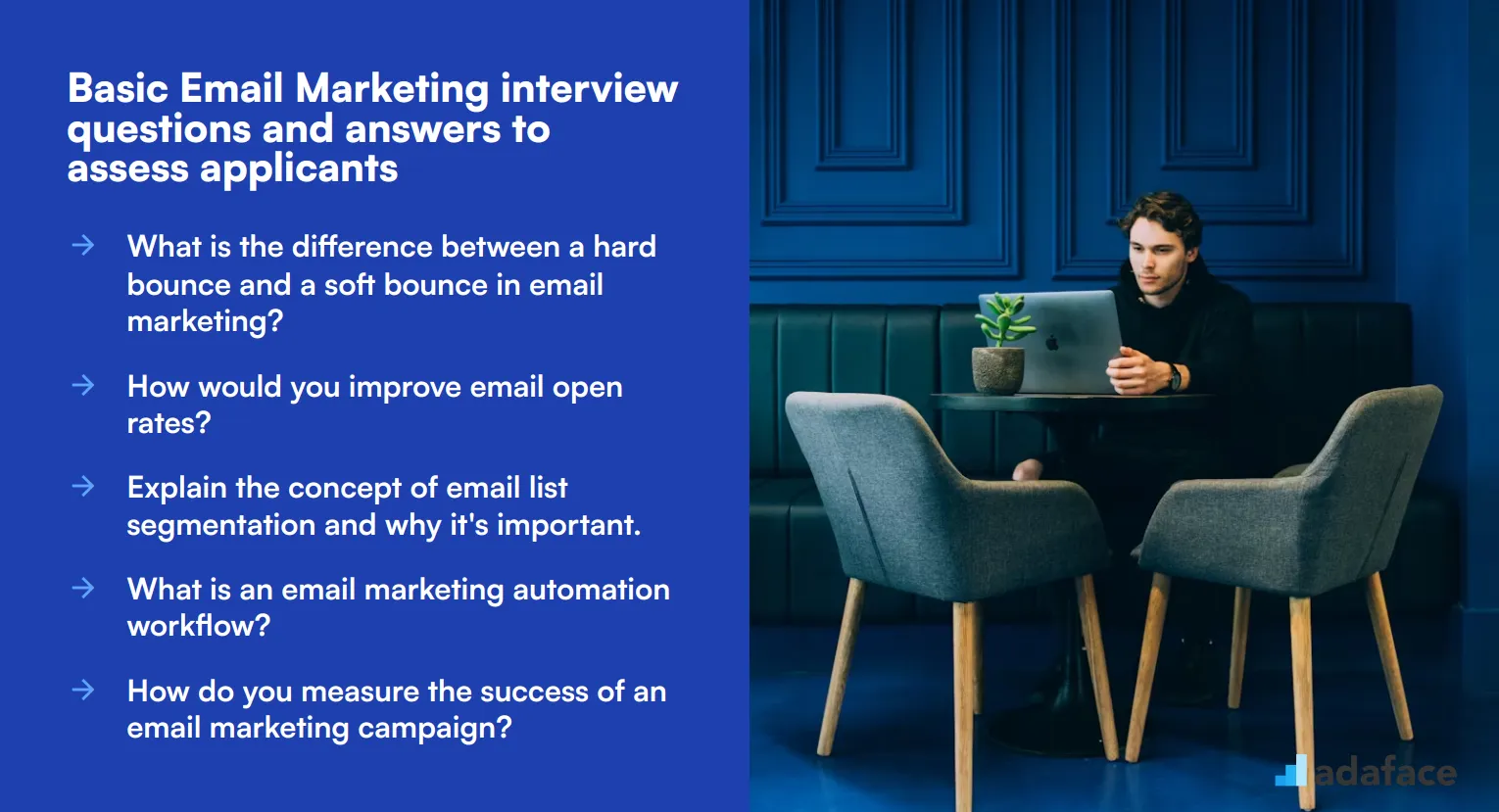
To assess whether your applicants have the fundamental knowledge and skills required for email marketing, use these 15 basic interview questions. These questions cover essential concepts and practices, helping you gauge a candidate's understanding of email marketing principles.
- What is the difference between a hard bounce and a soft bounce in email marketing?
- How would you improve email open rates?
- Explain the concept of email list segmentation and why it's important.
- What is an email marketing automation workflow?
- How do you measure the success of an email marketing campaign?
- What is the CAN-SPAM Act and why is it important for email marketers?
- Describe the components of an effective email subject line.
- What is A/B testing in email marketing and how would you use it?
- How do you maintain a healthy email list?
- What are the key elements of an effective email call-to-action (CTA)?
- Explain the importance of mobile optimization in email marketing.
- What is an email drip campaign and when would you use one?
- How do you handle email unsubscribes and why is it important?
- What are some best practices for email design and layout?
- How would you use personalization in email marketing to improve engagement?
8 Email Marketing interview questions and answers to evaluate junior marketers
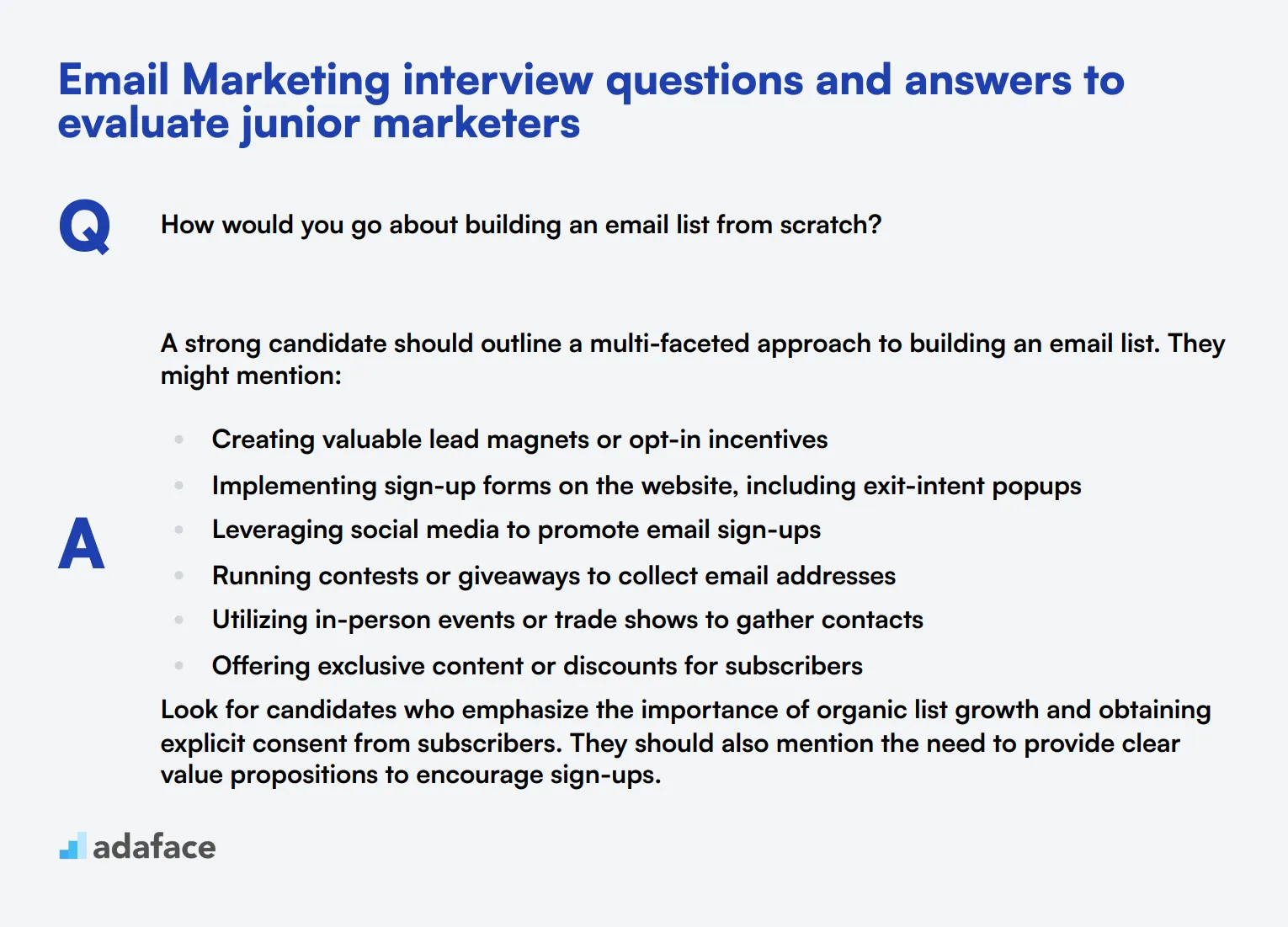
Ready to evaluate junior marketers for your email campaigns? These eight questions will help you gauge their understanding of email marketing fundamentals and best practices. Use them to assess candidates' knowledge, problem-solving skills, and ability to drive engagement through effective email strategies.
1. How would you go about building an email list from scratch?
A strong candidate should outline a multi-faceted approach to building an email list. They might mention:
- Creating valuable lead magnets or opt-in incentives
- Implementing sign-up forms on the website, including exit-intent popups
- Leveraging social media to promote email sign-ups
- Running contests or giveaways to collect email addresses
- Utilizing in-person events or trade shows to gather contacts
- Offering exclusive content or discounts for subscribers
Look for candidates who emphasize the importance of organic list growth and obtaining explicit consent from subscribers. They should also mention the need to provide clear value propositions to encourage sign-ups.
2. What strategies would you use to re-engage inactive subscribers?
An effective answer should include a mix of tactics to win back inactive subscribers:
- Segmenting the inactive list based on past engagement levels or interests
- Creating a targeted re-engagement campaign with compelling subject lines
- Offering exclusive 'we miss you' discounts or incentives
- Asking for feedback or preferences to improve future communications
- Sending a 'last chance' email before removing unresponsive subscribers
- Varying email content and format to spark interest
Pay attention to candidates who mention the importance of analyzing why subscribers became inactive in the first place. They should also discuss the balance between trying to re-engage and knowing when to clean the list to maintain overall deliverability.
3. How would you craft an effective welcome email series for new subscribers?
A knowledgeable candidate should outline a strategic approach to welcome emails:
- Start with an immediate thank you email that sets expectations
- Follow up with an introduction to the brand and its values
- Provide a series of emails highlighting key products or services
- Include educational content that adds value to the subscriber
- Offer a special welcome discount or incentive to encourage first purchase
- Ask for preferences to tailor future communications
Look for candidates who emphasize the importance of timing and spacing these emails appropriately. They should also mention personalizing the content based on how the subscriber joined the list and segmenting if possible.
4. What are some key metrics you would track to evaluate email campaign performance, and why?
A comprehensive answer should include both surface-level and deeper metrics:
- Open rate: Indicates subject line effectiveness and sender reputation
- Click-through rate (CTR): Measures content relevance and CTA effectiveness
- Conversion rate: Shows how well the email drives desired actions
- Bounce rate: Reflects list quality and deliverability issues
- Unsubscribe rate: Indicates overall satisfaction with email content
- Revenue per email: Measures the direct financial impact of campaigns
- List growth rate: Shows the health and expansion of the subscriber base
Strong candidates will not only list these metrics but also explain how they use them to inform future campaign strategies and improvements. They might also mention the importance of benchmarking against industry standards and past performance.
5. How would you approach email design for better mobile engagement?
An ideal response should cover both design and content considerations:
- Use a responsive, mobile-first design approach
- Implement a single-column layout for easy scrolling
- Increase font sizes for better readability on small screens
- Use large, touch-friendly buttons for CTAs
- Optimize images for quick loading on mobile devices
- Keep subject lines and preheader text concise
- Front-load important content to capture attention quickly
Look for candidates who emphasize the importance of testing emails across various devices and email clients. They should also mention the significance of concise copywriting for mobile users and possibly discuss the use of progressive disclosure techniques.
6. What strategies would you use to improve email deliverability?
A comprehensive answer should cover various aspects of deliverability:
- Regularly clean and validate email lists to remove invalid addresses
- Implement double opt-in to ensure subscriber intent
- Use authentication protocols like SPF, DKIM, and DMARC
- Monitor and improve sender reputation
- Segment lists and personalize content to increase engagement
- Optimize send times based on subscriber behavior
- Maintain a consistent sending schedule
- Provide easy unsubscribe options to avoid spam complaints
Strong candidates will also mention the importance of monitoring deliverability metrics, such as inbox placement rates, and adjusting strategies based on these insights. They might also discuss the role of content quality in avoiding spam filters.
7. How would you integrate email marketing with other digital marketing channels?
A strong answer should demonstrate a holistic view of digital marketing:
- Use social media to grow email lists and vice versa
- Retarget email subscribers with personalized ads on other platforms
- Align email content with current social media or content marketing campaigns
- Use email to drive traffic to blog posts or landing pages
- Incorporate user-generated content from social media into emails
- Use data from email engagement to inform content strategy across channels
- Create cohesive messaging and branding across all touchpoints
Look for candidates who emphasize the importance of creating a seamless customer experience across all channels. They should also mention the value of data integration and using insights from one channel to improve performance in others.
8. How would you use customer data to personalize email campaigns?
An effective answer should cover various personalization strategies:
- Segment lists based on demographics, purchase history, or behavior
- Use dynamic content to tailor images, product recommendations, or offers
- Personalize subject lines and preheader text
- Create triggered emails based on specific user actions or milestones
- Use location data to send geographically relevant content or offers
- Implement browse and cart abandonment emails
- Customize send times based on individual engagement patterns
Strong candidates will emphasize the importance of data privacy and consent in personalization efforts. They should also discuss the balance between personalization and maintaining efficiency in email production.
18 intermediate Email Marketing interview questions and answers to ask mid-tier marketers
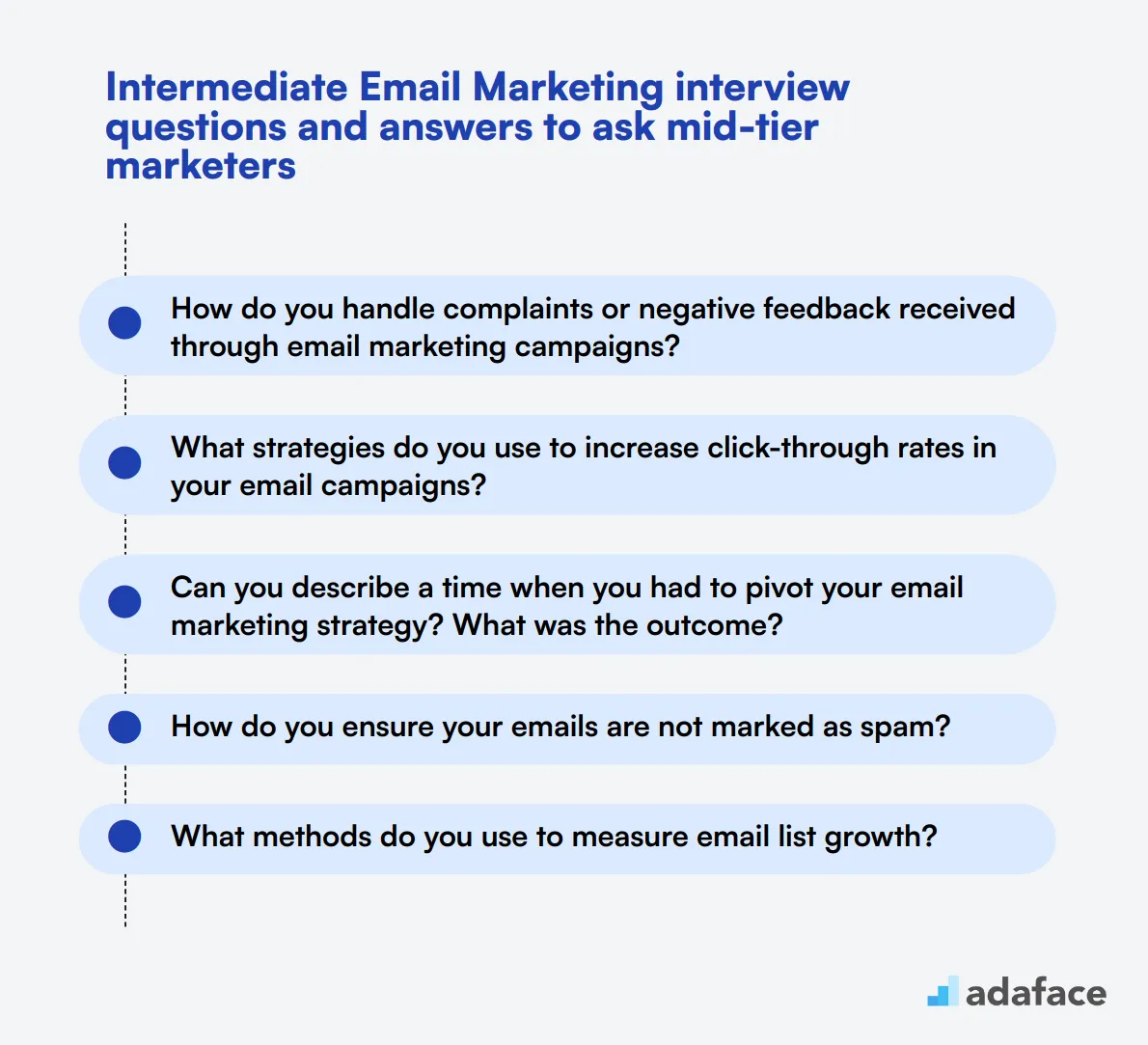
To determine whether your applicants have the right skills to excel as mid-tier email marketers, ask them some of these 18 intermediate email marketing interview questions. Tailored for recruiters and hiring managers, this list will help identify candidates who possess the technical know-how and strategic thinking needed to drive successful email campaigns. For more insights on marketing roles, check out this link.
- How do you handle complaints or negative feedback received through email marketing campaigns?
- What strategies do you use to increase click-through rates in your email campaigns?
- Can you describe a time when you had to pivot your email marketing strategy? What was the outcome?
- How do you ensure your emails are not marked as spam?
- What methods do you use to measure email list growth?
- How do you integrate email marketing efforts with social media campaigns?
- What role does storytelling play in your email marketing strategy?
- How do you use email marketing to support customer retention?
- How do you segment your audience for targeted email campaigns?
- Explain how you would use dynamic content in an email.
- Can you give an example of a successful re-engagement campaign you have managed?
- What are some challenges you’ve faced with email deliverability and how did you overcome them?
- How do you keep up with the latest trends and best practices in email marketing?
- How do you use analytics to improve future email campaigns?
- Describe your approach to creating email templates that are both visually appealing and functional.
- How do you approach split testing different elements of an email campaign?
- Can you explain the importance of email frequency and how you determine the optimal schedule?
- How do you use customer feedback to refine your email marketing strategy?
7 Email Marketing interview questions and answers related to campaign strategies
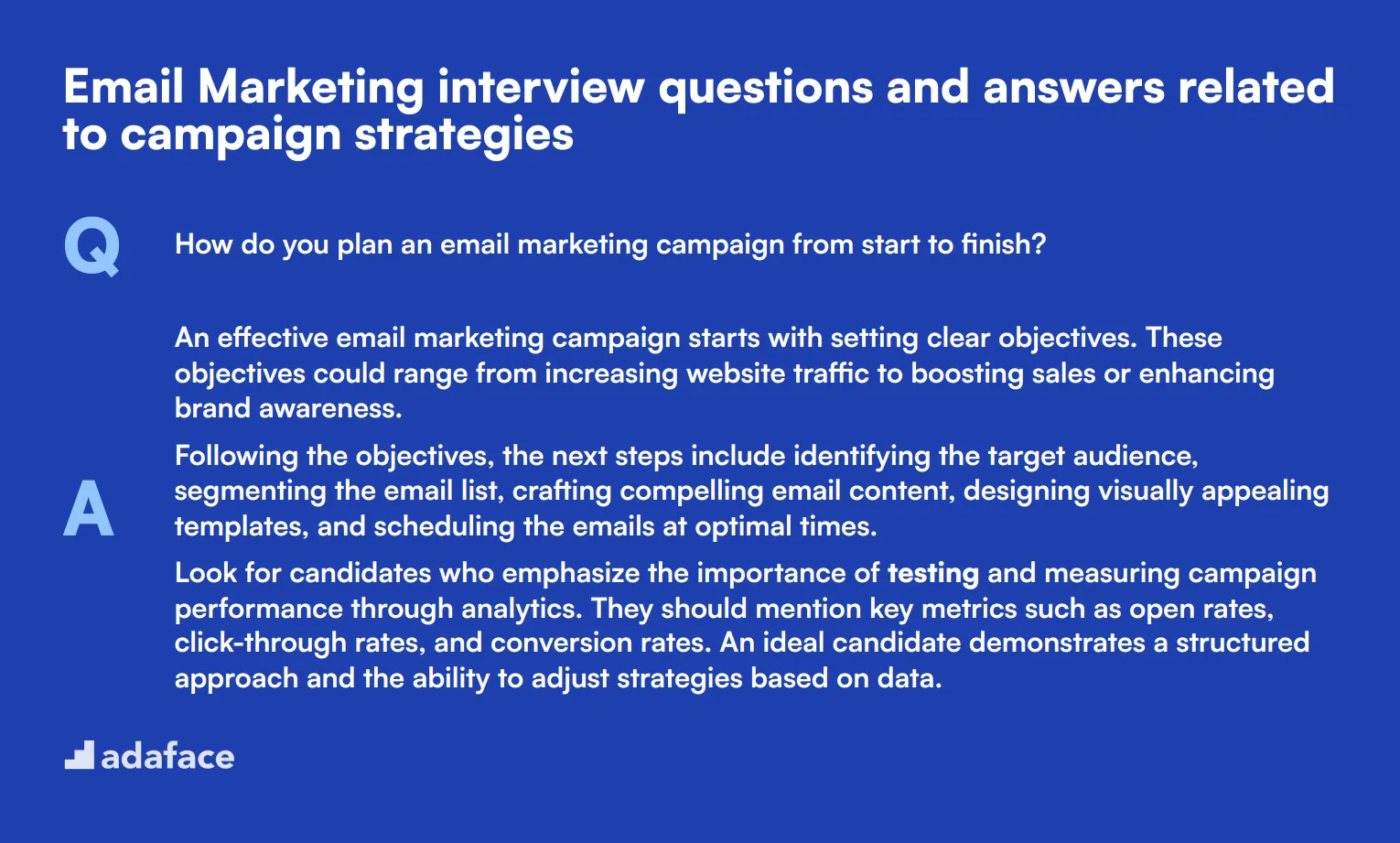
Use these interview questions to dive deep into a candidate's campaign strategies for email marketing. This list will help you uncover their approach and creativity in planning and executing email campaigns, ensuring they can drive engagement and conversions.
1. How do you plan an email marketing campaign from start to finish?
An effective email marketing campaign starts with setting clear objectives. These objectives could range from increasing website traffic to boosting sales or enhancing brand awareness.
Following the objectives, the next steps include identifying the target audience, segmenting the email list, crafting compelling email content, designing visually appealing templates, and scheduling the emails at optimal times.
Look for candidates who emphasize the importance of testing and measuring campaign performance through analytics. They should mention key metrics such as open rates, click-through rates, and conversion rates. An ideal candidate demonstrates a structured approach and the ability to adjust strategies based on data.
2. How would you define your approach to crafting email content that resonates with your audience?
Crafting email content begins with understanding the audience's needs, preferences, and pain points. The content should be relevant, engaging, and provide value to the reader.
Personalization plays a crucial role. Using recipient names, tailoring content based on past interactions, and segmenting the audience into smaller groups for more targeted messaging can significantly enhance engagement.
Candidates should show a good grasp of storytelling techniques and the importance of clear, compelling calls-to-action. Look for examples of how they have successfully used these strategies in past campaigns.
3. What strategies do you use to ensure high deliverability rates for your email campaigns?
To ensure high deliverability rates, it's essential to maintain a clean email list. This involves regularly removing inactive subscribers, correcting invalid email addresses, and ensuring compliance with email regulations.
Other key strategies include using a reputable email service provider, authenticating emails with SPF, DKIM, and DMARC, and avoiding spammy content and design elements.
Look for candidates who mention the importance of monitoring deliverability metrics and adjusting strategies based on data. An ideal candidate is knowledgeable about technical aspects and proactive in tackling deliverability challenges.
4. How do you segment your email list for targeted campaigns?
Segmentation involves dividing your email list into smaller groups based on specific criteria such as demographics, past purchase behavior, engagement level, or preferences.
Effective segmentation allows for more personalized and relevant messaging, which can lead to higher engagement and conversion rates.
Candidates should highlight their experience with different segmentation strategies and tools. They should also discuss how segmentation has positively impacted their campaign performance in the past.
5. How do you integrate email marketing with other digital marketing channels?
Integrating email marketing with other channels like social media, content marketing, and SEO can create a cohesive and effective marketing strategy.
For example, emails can drive traffic to blog posts or social media profiles, while social media campaigns can encourage users to subscribe to your email list.
Candidates should demonstrate their ability to create cross-channel campaigns that amplify each channel's strengths. Look for examples of integrated campaigns they have managed and the results they achieved.
6. What is your process for creating and testing email subject lines to optimize open rates?
Creating compelling subject lines involves understanding the audience and what resonates with them. It's essential to keep subject lines clear, concise, and relevant to the email content.
Testing is crucial. A/B testing different subject lines can provide insights into what works best. Variables to test include length, personalization, emojis, and urgency.
Look for candidates who emphasize the importance of data-driven decisions. They should discuss their methodology for testing and optimizing subject lines and share examples of successful subject lines they have created.
7. How do you measure and analyze the success of your email marketing campaigns?
Success is measured through key performance indicators (KPIs) such as open rates, click-through rates, conversion rates, and ROI (return on investment).
Analyzing the data helps identify what worked well and what didn't, providing insights for future campaigns. It's essential to use tools like Google Analytics to track user behavior post-click.
Candidates should show their ability to interpret data and make informed decisions. Look for examples of how they have used data to optimize campaigns and achieve better results.
12 Email Marketing questions related to content creation and design
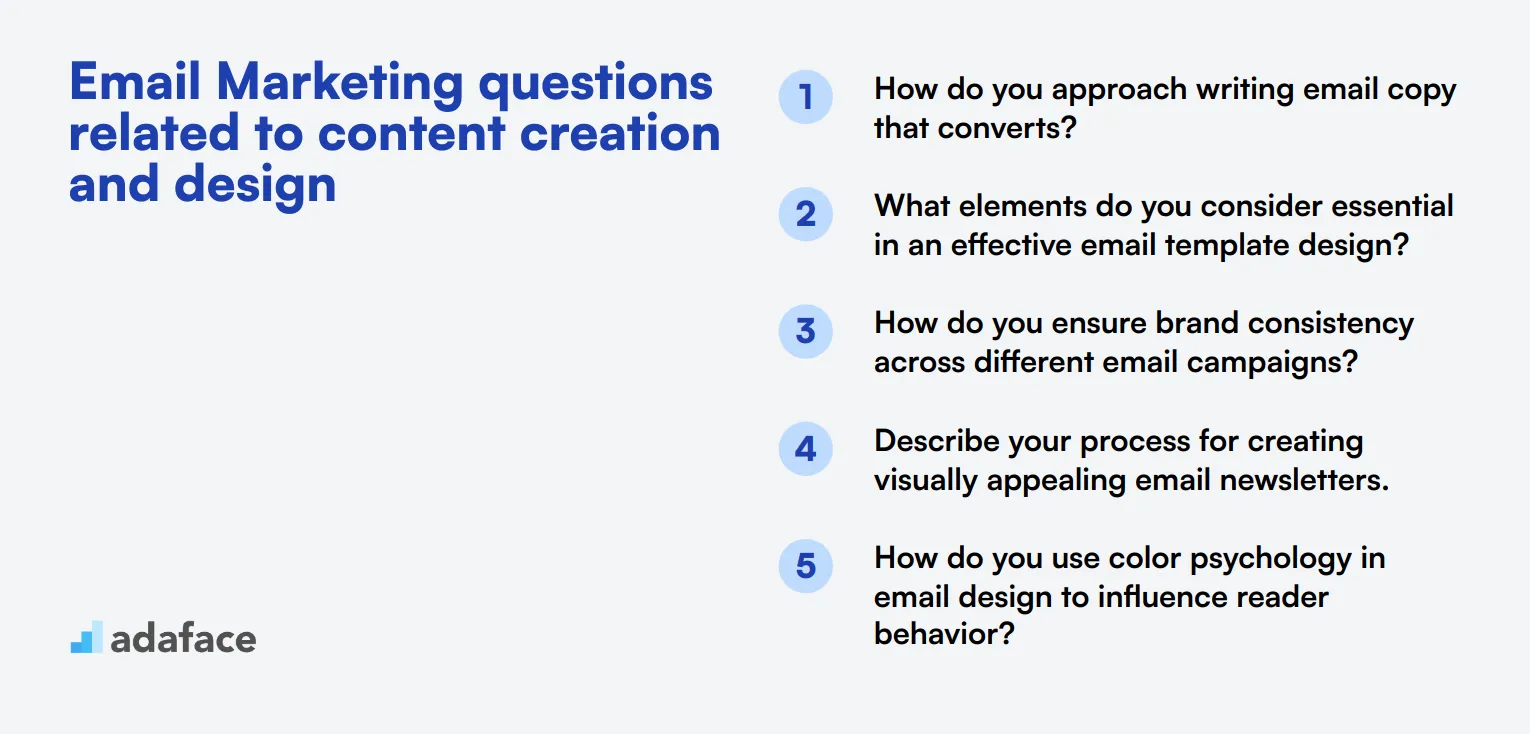
To assess a candidate's proficiency in content creation and design for email marketing, consider asking these questions. They will help you evaluate the applicant's ability to craft compelling emails that engage subscribers and drive results.
- How do you approach writing email copy that converts?
- What elements do you consider essential in an effective email template design?
- How do you ensure brand consistency across different email campaigns?
- Describe your process for creating visually appealing email newsletters.
- How do you use color psychology in email design to influence reader behavior?
- What strategies do you employ to make your emails scannable and easy to read?
- How do you approach creating email content for different stages of the customer journey?
- What tools do you use for email design and why do you prefer them?
- How do you ensure your email designs are accessible to all users, including those with disabilities?
- Describe how you would create an email series for a product launch.
- How do you balance text and visuals in your email designs?
- What techniques do you use to create urgency in your email copy?
10 situational Email Marketing interview questions for hiring top marketers
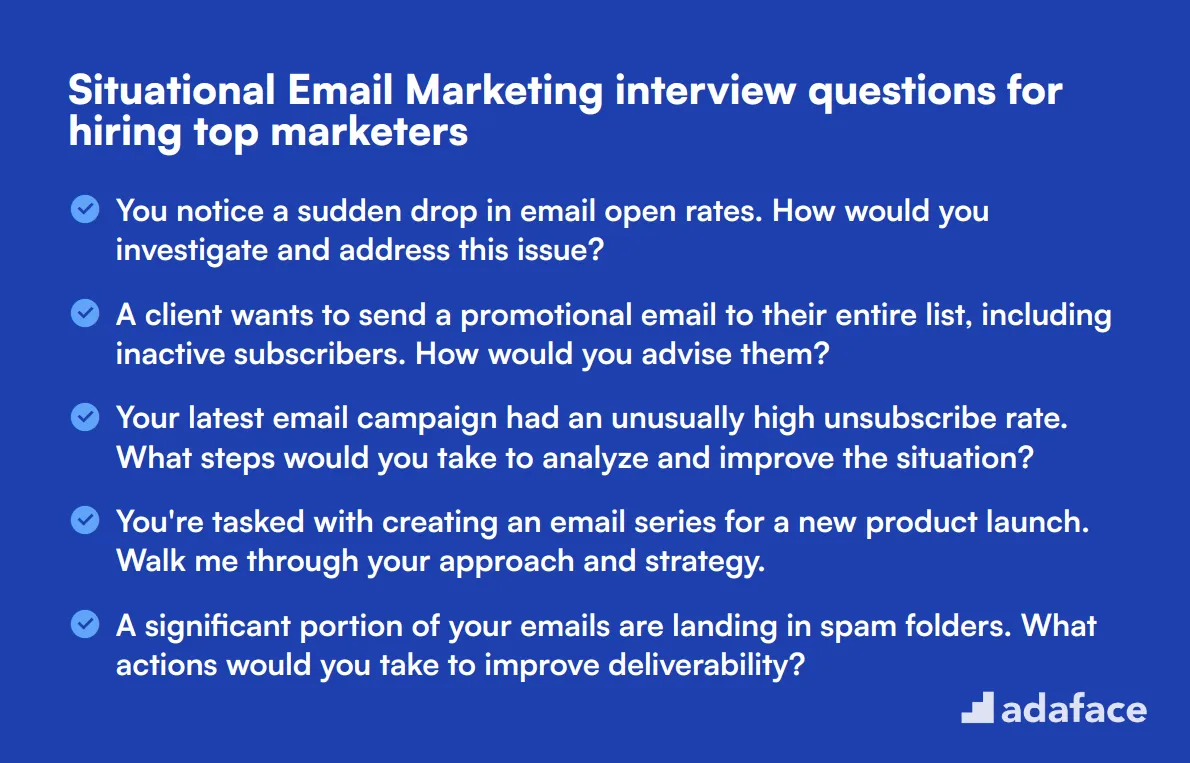
To assess a candidate's practical email marketing skills, use these situational questions during interviews. They help evaluate how applicants handle real-world scenarios and make decisions in email marketing contexts.
- You notice a sudden drop in email open rates. How would you investigate and address this issue?
- A client wants to send a promotional email to their entire list, including inactive subscribers. How would you advise them?
- Your latest email campaign had an unusually high unsubscribe rate. What steps would you take to analyze and improve the situation?
- You're tasked with creating an email series for a new product launch. Walk me through your approach and strategy.
- A significant portion of your emails are landing in spam folders. What actions would you take to improve deliverability?
- Your company is launching a new service. How would you use email marketing to generate excitement and sign-ups?
- You've been asked to improve customer retention through email marketing. What strategies would you implement?
- An important email was sent with a broken link. How would you handle this situation and communicate with subscribers?
- Your team wants to experiment with interactive emails. What elements would you suggest incorporating and why?
- You need to quickly grow your email list for an upcoming campaign. What ethical tactics would you employ?
Which Email Marketing skills should you evaluate during the interview phase?
Evaluating a candidate's Email Marketing skills during the interview phase is vital, but it's important to remember that one conversation may not reveal everything. However, there are key skills that are fundamental to the role that interviewers should prioritize. Focusing on these skills can help ensure you're selecting the right fit for your team.
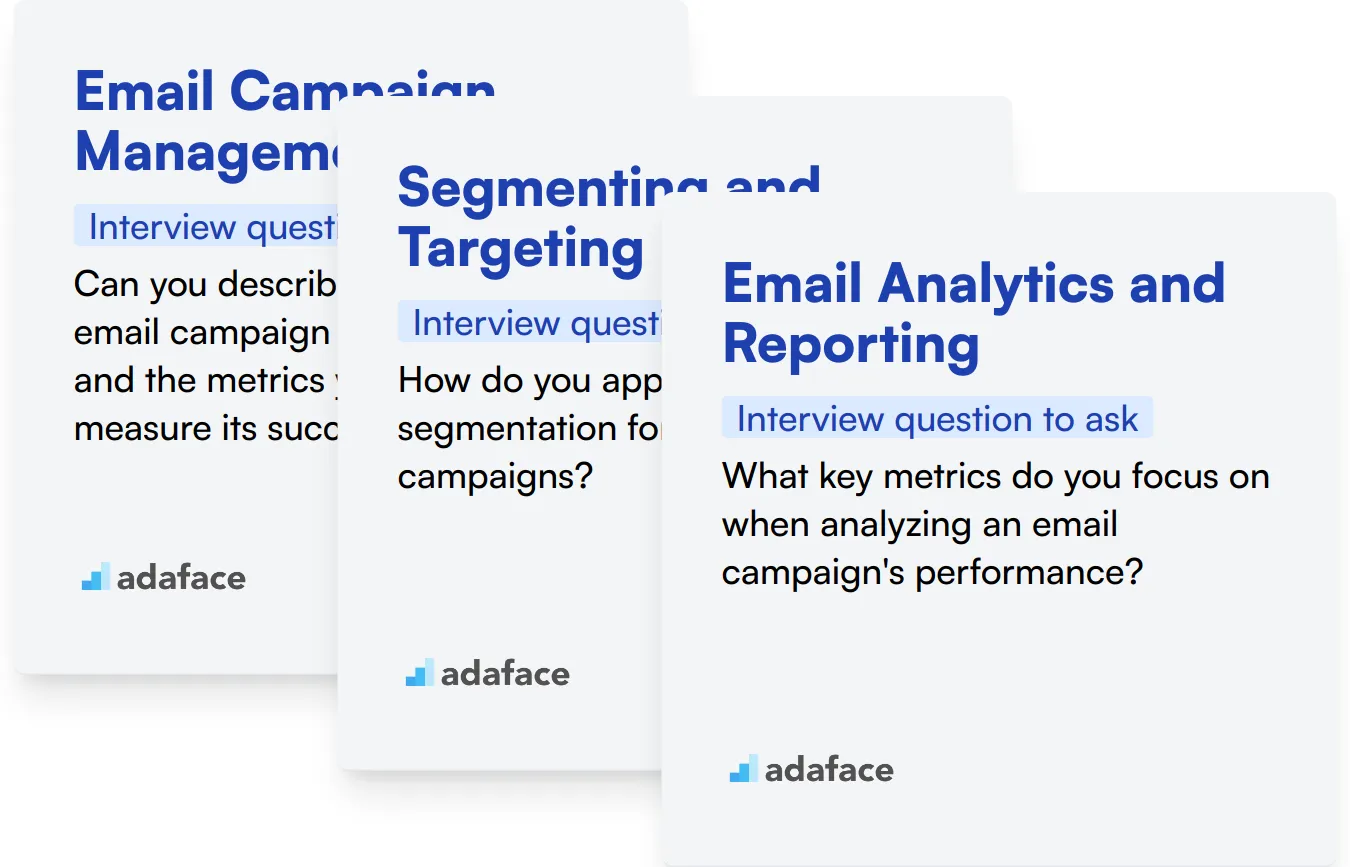
Email Campaign Management
To evaluate this skill, consider using an assessment test with relevant MCQs that probe the candidate's knowledge of campaign management principles. You can explore our Email Marketing assessment test to find suitable questions.
Additionally, targeted interview questions can provide insights into a candidate's practical experience. Asking specific questions about their campaign management approach can reveal their depth of knowledge.
Can you describe a successful email campaign you managed and the metrics you used to measure its success?
When asking this question, look for specific metrics the candidate tracked, such as open rates, click-through rates, and conversion rates. Their ability to articulate the campaign's goals and the strategies they employed will indicate their competence in email campaign management.
Segmenting and Targeting
Consider incorporating an assessment test with MCQs about audience segmentation strategies to gauge their expertise. You could find resources in our Marketing Analysis test that cover relevant topics.
To further assess this skill, ask candidates about their experience with audience segmentation in previous campaigns.
How do you approach audience segmentation for email campaigns?
Pay attention to their understanding of different segmentation criteria, such as demographics, behavior, and purchase history. Their response should reflect a strategic approach to targeting for optimal engagement.
Email Analytics and Reporting
An MCQ assessment dedicated to email analytics can help filter candidates based on their knowledge of key performance indicators. Our Digital Marketing test includes relevant analytics-related questions.
You may also want to ask targeted interview questions that explore a candidate's experience with email analytics.
What key metrics do you focus on when analyzing an email campaign's performance?
Look for responses that highlight metrics like open rates, click rates, and conversion rates. A well-rounded answer should reflect their ability to utilize data for informed decision-making.
Implementing Email Marketing Interview Questions Effectively
Before you start using the insights from this guide to enhance your hiring process, here are a few expert tips to make the most of your email marketing interview questions.
1. Incorporate Pre-Interview Skill Tests
Using skill tests before face-to-face interviews can significantly streamline the selection process. These tests help verify the candidate's claims about their skills and provide a quantitative basis for comparison.
Email Marketing-related tests such as the digital marketing test or the more specific content strategy test can identify candidates with the necessary technical knowledge. By focusing on these preliminary tests, you can ensure that only the most qualified candidates reach the interview phase, thus saving time and resources.
The insights gained from these assessments allow you to tailor your interviews to probe deeper into areas where a candidate might need to demonstrate more proficiency. This not only enhances the quality of your hiring decisions but also creates a structured recruitment framework.
2. Strategically Choose Interview Questions
With limited time during interviews, selecting the right questions is essential. Focus on crafting a set of questions that thoroughly evaluate the candidate's relevant skills and experiences.
Consider integrating questions from related categories to gain a holistic view of the candidate's capabilities. For instance, exploring topics from SEO, content marketing, or even general digital marketing can provide valuable insights into a candidate's broader marketing skills.
Also, remember to balance the technical questions with those that evaluate soft skills such as communication or problem-solving, which are just as crucial for a successful email marketer.
3. Utilize Follow-Up Questions
Utilizing follow-up questions can significantly enhance the depth of your interview. These questions help you to gauge not just the correctness of an answer, but the reasoning and process behind it, offering insights into the candidate's thinking and problem-solving approach.
For example, if a candidate describes a successful email campaign they designed, a good follow-up could be, 'What were the key metrics you used to measure its success, and why?' This question reveals more about their analytical skills and understanding of marketing metrics.
Use Email Marketing interview questions and skills tests to hire talented marketers
If you are looking to hire someone with email marketing skills, it's important to ensure they possess the required expertise accurately. The best way to do this is by using skill tests from our library, such as the Digital Marketing Test or the Content Strategy Test.
Once you've used these tests, you can shortlist the best applicants and invite them for interviews. For the next steps, you can sign up on our online assessment platform or explore our pricing options.
Digital Marketing Test
Download Email Marketing interview questions template in multiple formats
Email Marketing Interview Questions FAQs
Look for skills in campaign strategy, content creation, analytics, automation tools, and understanding of email marketing best practices.
Ask questions about email deliverability, A/B testing, segmentation, and their experience with various Email Marketing platforms.
Present scenarios like improving open rates, handling unsubscribes, or creating a re-engagement campaign to assess problem-solving skills.
Ask about their approach to subject lines, email design, and how they tailor content for different audience segments.
Inquire about their experience with metrics like click-through rates, conversion rates, and how they use data to optimize campaigns.

40 min skill tests.
No trick questions.
Accurate shortlisting.
We make it easy for you to find the best candidates in your pipeline with a 40 min skills test.
Try for freeRelated posts
Free resources




